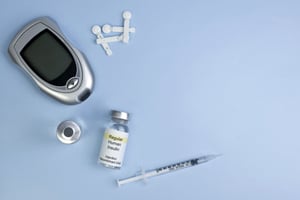 Canadian scientists have demonstrated for the first time what has long been hypothesised – it is possible to reverse type 2 diabetes with lifestyle changes and tight blood glucose control.
Canadian scientists have demonstrated for the first time what has long been hypothesised – it is possible to reverse type 2 diabetes with lifestyle changes and tight blood glucose control.
The team from McMaster University in Canada tested the idea in diabetic patients who had been symptomatic for up to three years, underwent a personalised exercise regimen, a diet reducing their calorie intake by 500 to 750 per day and continued use of glucose-controlling drugs (metformin, acarbose and in some cases basal insulin) to closely manage blood sugar levels.
After four months 40% (11 of 27) of patients who adhered to the changes were able to cease taking their medications and stay in complete or partial remission from diabetes according to investigator Natalia McInnes.
The discovery – published in the Journal of Clinical Endocrinology & Metabolism – undermines the notion that type 2 diabetes is an irreversible and progressive disease, with a healthy diet, exercise and medications only serving to manage the condition. The hypothesis is that the intervention gives the pancreas – which produces insulin – a much-needed rest and decreases fat stores in the body, which in turn improves insulin production and effectiveness.
The study was fairly small at just 83 participants, who were randomly allocated into three study groups. Two groups were allocated to the intensive regimen, with regular visits to a nurse to monitor adherence and progress for either eight or 16 weeks. The third control group received standard blood glucose management and lifestyle advice.
Three months after the intervention was completed, 11 out of 27 individuals in the 16-week intervention group met criteria for complete or partial diabetes remission, compared to four out of 28 individuals in the control group. In the eight-week group, six out of 28 were deemed to be in remission.
McInnes said the findings might “shift the paradigm of treating diabetes from simply controlling glucose to an approach where we induce remission and then monitor patients for any signs of relapse”, which would have an extraordinary impact on medicine usage for the disease.
Clearly, getting people to comply with the changes may be challenging, but on that point initial findings from the trial are also encouraging.
“The idea of reversing the disease is very appealing to individuals with diabetes. It motivates them to make significant lifestyle changes and to achieve normal glucose levels with the help of medications,” said McInnes.
The team also suggest that it may be possible to improve the remission therapy through the use of more effective diabetes drugs.
According to lead investigator Hertzel Gerstein, the team chose to use metformin, acarbose and basal insulin glargine in this trial as these medications have all been shown to slow or prevent the development of type 2 diabetes.
“Other drug combinations could lead to higher remission rates and need to be systematically studied in regard to this outcome,” he said.
Data from the recently published Health at a Glance: Europe 2016 document from the Organisation for Economic Co-operation and Development (OECD) and European Commission (EC) found that 7% of Europeans had diabetes in 2014 – with the highest levels in Greece, Portugal and France – and that the disease cost around €100bn in 2013.




